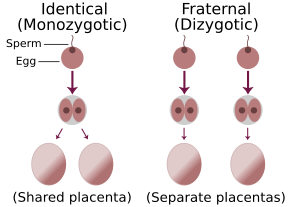We all demand school reform- we just don’t agree on what that means. What a surprise! My issue is that most “reformers” don’t like admitting one key fact- some of us CAN learn better and faster than others. And, when everyone is afforded “gifted and talented” status, there is no value for those that are truly gifted or talented. Those that can (do), get bored and don’t. I am all for equal opportunity- but not everyone is destined to create the scientific or technological breakthrough, nor can everyone lead others to new destinations.
Dr. Claire Haworth and three other researchers (Asbury, Plomin, and Dale) at Kings College (the latter is now at the University of New Mexico) just demonstrated that environmental influence is important- but not more so than genetics. Before you jump down my throat, let me finish HOW they did their study. The subjects in their study were 4000 pairs of twins, none separated by birth, all living in the same home. (Actually, the full study including 9906 individuals, including 4405 twin pairs; but not all students took all tests.) The difference between the twins was that some were fraternal and some were identical. (Remember that identical twins came from one egg that separated (monozygotic) and have the same DNA; fraternal twins just happened to be born at the same time from two different eggs (dizygotic)- their DNA differs.)
Their study involved teacher assessment and test results in three major areas: English (including speaking and listening; reading; and writing); Mathematics (including using and applying mathematics; number and algebra; shape, space and measures; and handling data); and Science (including scientific inquiry; life processes and living things; physical processes; and materials and their properties). Performance was rated on a 1 to 8 scale; children who are 14 (called Key Stage 3 in the UK curriculum) should demonstrate a level 5 or 6 on this teacher evaluation. The evaluations were correlated to achievement test scores (intercorrelation of 0.83).
They found small (but significant) differences for sex and cognitive ability in their study (which did not affect the overall results). The researchers also took into account that that prior achievement (which affects current learning), as well as the subject’s general cognitive ability (termed “g”) could be factors; their study included these variatns as part of their analysis to discern the true results. The corrected achievement scores were still affected by genetic factors that are independent of previous achievement or g.
The key finding is that the identical twins developed similar results in the tests; the fraternal twins did not. It should be noted that this does NOT mean the environmental factors of learning do not matter- just that one’s innate abilities count just as much in the overall achievement. Those with greater abilities are able to develop more value or information from the instruction provided.
The researchers also found astounding results for “shared” environment. (We strive to provide proper environments for all our students.) As opposed to previous studies, all the test subjects for “shared” environment had the same homes (as well as classrooms and schools). They found that very low variances in teacher-rated achievement (30%) and test scores (20%) that could be due to environment. The latter is contrary to our “normal beliefs” that attributes higher variations to the corrected achievement scores due to environmental factors.
(The researchers mention that studying separated twins would provide a useful, further examination of this environmental factor. However, rather than examining those separated by adoption, they propose examining twins where one, unfortunately, experienced an accident or illness or twins that have different teachers or extracurricular activities.)








